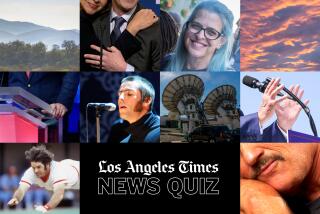The Great Debate: Season Opener or a Meaningless Exhibition? : HOWARD ROSENBERG
- Share via
No wonder that rubbishspeak is now the official language of the 1988 presidential campaign.
Thanks primarily to television, we’re the most sound-bitten, photo-smitten electorate in history. More evidence arrives at 5 p.m. Sunday when Massachusetts Gov. Michael S. Dukakis and Vice President George Bush meet in their first of two televised debates that many in the news media have labeled “all-important.”
And don’t forget all-American.
The sound bites will be a little longer than usual, but so will the photo opportunities, unfortunately, with six cameras aimed at the candidates as they stand behind their custom lecterns and try to be what their consultants tell them America wants them to be.
Will Mike (Dirty Dozen) Dukakis show up in a tank to dramatize his toughness on defense? Will George (Yankee Doodle) Bush demonstrate his patriotism by unfurling himself like Old Glory?
Or will both candidates buck tradition and pledge allegiance to substance instead of nonsense?
Not likely, given the trivia of this week’s dispute over the size of the lecterns and podium and over the makeup of the debate’s panel of media questioners. The Republicans were seeking a combination of print and broadcast people (here’s one vote for Morton Downey Jr.) while the Democrats--aiming for a really big show--wanted only network anchors.
Maybe Tom Brokaw could beam his questions from Seoul, between water polo and synchronized swimming.
NBC badly erred in bending to pressure and revoking an earlier decision to skip the 90-minute debate in favor of its coverage of the Seoul Olympics. Not that the well-coached Dukakis and Bush won’t show world-class moves of their own--only that nothing is gained from NBC televising an event also available on ABC, CBS, PBS, CNN and C-SPAN.
An event of dubious significance, moreover.
The debate can be fun. Have a good time, put on party hats and make popcorn--either to eat or throw at the screen. But don’t take any of this seriously. Other than potentially exposing a drooling, deranged candidate, debates are merely carefully staged TV performances, not necessarily presidential performances.
Candidates openly cram for debates as students cram for exams--raising the possibility that everything cited Sunday will be forgotten Monday.
That aside, shouldn’t Bush and Dukakis be expected to have all this relevant information in their heads without a last-minute crash course? But if such recall is too much to expect of candidates, then what purpose is served by them spouting off Sunday? To show voters which man has the best study habits? The best tutors?
Are we picking a President of the United States or a president of the student body?
The candidates are also prepping with their media coaches and engaging in practice debates with stand-ins. Swell! Will the new President get to practice with stand-ins when it’s crunch time with Mikhail Gorbachev?
Modern Presidents need basic TV skills to communicate with America via the camera. Yet televised debates celebrate a quality unwanted in someone having to make sensitive, thoughtful decisions in the Oval Office: They celebrate hip-shooting, fast responses to complex questions; crisp, funny, evasive one-liners; and snappy sound-bite retorts that may put an opponent on the defensive but have little connection to White House reality.
Can you just picture an aide awakening Ronald Reagan with a critical problem in the middle of the night and hearing the President give the scripted, celebrated reply he gave Jimmy Carter in 1980? “There you go again.”
Cute, but irrelevant.
Unfortunately, the candidate who slowly and carefully weighs questions in one of these hit-and-run debates is the candidate later described as fuzzy and indecisive, the candidate who is labeled the loser.
By whom?
By the news media, that’s who. Reporters and pundits are the ones who make the call, after filtering the debate through their own biases and preconceptions. These self-designated sages and national spokespersons will probably tell you that TV-experienced Dukakis has to win big to win at all, because he’s expected to win. And if Bush misspeaks, as he’s prone to do, they’ll clobber him.
How do the media know what America is thinking? What are their sources, beyond each other? They cite the polls, of course--the very polls that TV reporters themselves have helped influence by their repeated judgmental pronouncements on the candidates.
And the same polls those goofy TV pictures of the candidates have helped influence.
America is being relentlessly and oppressively photo-opportunitied by the candidates and media. What justification is there for TV covering Dukakis riding around in a tank or Bush touring a flag factory?
Night after night, however, the networks hungrily dip into this kettle of foolishness, at once showing and criticizing a multitude of staged-for-TV events, as if their skeptical words eclipse the cumulative impact of powerful pictures. Don’t bet on it.
It’s as if the TV people were telling viewers:
“We’re proving this is a non-story by showing you the non-story. We’re proving that this is nothing but a photo opportunity by showing you the photo opportunity. We’re showing how the candidates try to use us by letting them use us. Most of all, we’re showing how much we crave visuals--at any cost.”
It all could end. There would be no photo opportunities--the vacuous, mutually exploitative process would simply disappear--were there no cameras present to record them.
Take that up with the people who dispatch the cameras and make the editorial decisions, not the media-smart candidates who are merely feeding TV’s addiction to pictures.
And in the process ignoring the public need.
More to Read
Get the L.A. Times Politics newsletter
Deeply reported insights into legislation, politics and policy from Sacramento, Washington and beyond. In your inbox twice per week.
You may occasionally receive promotional content from the Los Angeles Times.









